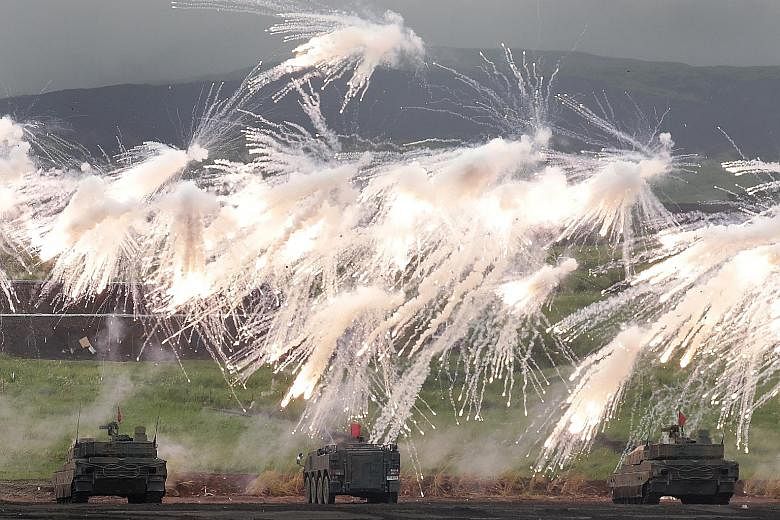Despite a detente on the Korean peninsula and warming bilateral ties with China, Japan yesterday described its security environment as "increasingly severe".
North Korea has not fired a single missile nor conducted any nuclear test this year. In June, Japan and China began a joint conflict hotline to stave off an accidental military clash in the East China Sea.
Even so, the Defence Ministry here said the threat to the country's security has worsened since the last review last year due to more tangible and acute destabilising factors, such as the impasse over Pyongyang's denuclearisation and the expansive military might of China and Russia.
"There have been no specific actions by North Korea on the abandonment of its nuclear weapons and missiles. The Chinese military - with improved capabilities - has advanced into the oceans," Japanese Defence Minister Itsunori Onodera told a news conference. "We want the Japanese citizens to know that the security environment surrounding us is serious."
The 564-page Defence White Paper also pointed to more "grey zone" situations that are "neither pure peacetime nor contingencies over territory, sovereignty and economic interests".
It pointed to its territorial disputes with China over the Senkaku/ Diaoyu islets, with South Korea over the Takeshima/Dokdo islands, and with Russia over four islands known collectively as the Northern Territories/Southern Kurils.
Tokyo's defence document noted that Japan's Air Self-Defence Force scrambled 500 times against Chinese jets and 390 times against Russian jets last year.
-
White Paper upsets neighbours
-
Japan's latest defence White Paper has drawn the ire of the country's neighbours, China and the two Koreas.
The annual White Paper reiterated Japan's worries about China's increasing military spending and expanding naval ambitions. It said Beijing was trying to "change the status quo by coercion", referring to such actions as building up disputed islands in the South China Sea and expanding naval activities around East China Sea islands disputed by Japan, reported Agence France-Presse.
Chinese Foreign Ministry spokesman Hua Chunying yesterday dismissed the paper as containing "irresponsible" and "baseless accusations".
"We hope that the Japanese will not come up with all sorts of excuses to expand their military strength but instead look at the bigger picture of a stable relationship with China," she said.
The White Paper was also slammed by Seoul for repeating Tokyo's longstanding claim of sovereignty over islands which Japan calls Takeshima. The islands are controlled by South Korea, which calls them Dokdo.
"The Japanese government must bear in mind that repeating such unjustifiable and groundless allegations over Dokdo will not be helpful at all in building forward-looking relations between the two countries," the South Korean Foreign Ministry said in a statement.
The ministry summoned Mr Koichi Mizushima, Minister at the Japanese Embassy in Seoul, to lodge an official protest, reported Yonhap new s agency.
Pyongyang likewise took issue with the White Paper - Japan's first annual defence review since tensions eased on the Korean peninsula - for saying North Korea still poses a "serious and imminent threat" to Japan's security and the regional and international community.
The North's state media, Korean Central News Agency, said in a commentary yesterday: "It is hard to achieve durable peace and stability of the Korean peninsula and the world if Japan is allowed to chill the atmosphere of peace and set out to reinvade, persistently seeking to escalate tension."
"There has been a noticeable trend among neighbouring countries to modernise and reinforce their military capabilities," it said.
The White Paper comes days before the Defence Ministry is due to ask for a record budget of 5.3 trillion yen (S$65 billion) for fiscal year 2019, which begins next April. This will include the initial cost of buying the US-developed Aegis Ashore land-to-air missile defence system. The sum, first reported last week by Jiji news agency, which quoted insiders, is over 100 billion yen more than the budget for the current fiscal year.
The Aegis Ashore system was meant to defend against incoming missiles from North Korea.
The White Paper stressed that North Korea still possesses an arsenal of nuclear weapons, even while acknowledging that it was "significant" that North Korean leader Kim Jong Un made a pledge in writing to pursue the complete denuclearisation of the Korean peninsula after his summit with US President Donald Trump in Singapore in June.
Mr Onodera said: "We cannot simply overlook the fact that it possesses and fully deploys several hundred missiles that put nearly all of Japan within range."
The White Paper also noted China's moves to avoid an unexpected military clash with Japan. But it pointed to the rapid modernisation of the People's Liberation Army and its enhanced military assertiveness in the region as security threats.
It also noted Moscow's militarisation of the disputed islands north of Hokkaido, with the deployment of surface-to-ship missiles and the redesignation of a civilian airport to allow military use.
Given that countries in North-east Asia have been eyeing one another's defence strategies with suspicion, defence expert Tosh Minohara of Kobe University expects an ongoing arms race in the region to intensify.
"The current situation is a momentary lapse, a lull so to speak. We could be in a moment which is so precipitous that all hell can break loose at any time," he told The Straits Times.

